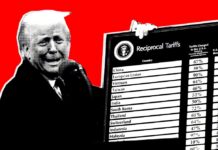The Department of Health and Human Services may soon release a proposal to lower drug prices in the Medicare program through what’s known as the “most favored nation” price. The policy, dreaded by the industry, would require drugmakers to accept the lowest price from the government for medicines paid by comparably wealthy countries in Europe and elsewhere.
It’s not clear the incoming Biden administration would keep such a regulation – so the move is viewed as a final, desperate effort to give Trump the ability to claim the “win” on lowering drug prices he’s sought for years.
The drug industry thought it had ducked a most-favored-nation policy.
For two years, Trump has been threatening to tie Medicare drug prices to lower prices in other countries as part of his overall push to slash drug prices in the United States. Yet his administration never proposed actual regulations, and even after the president issued an executive order on the matter, few in the industry took him seriously.
“They thought they ran out the clock out on it,” a GOP health-care lobbyist told me.
But now lobbyists say HHS is working to roll out regulations as soon as this week, in a move directly stemming from Trump’s anger and frustration.
Pfizer announced on Nov. 9 that its front-runner coronavirus vaccine was more than 90 percent effective — less than 48 hours after Biden was declared to have defeated Trump. And Moderna announced yesterday that its own vaccine was 95 percent effective.
Pfizer CEO Albert Bourla insisted the timing had nothing to do with politics — but that didn’t stop Trump from lashing out on Twitter, claiming the company was trying to avoid giving him any credit for helping to develop coronavirus vaccines.
“This is basically Trump being pissed off because he thought the industry campaigned against him and delayed in announcing the [vaccine] results, so he is going to get back at them with favored nations,” the GOP lobbyist told me.
Trump senior adviser Jason Miller tweeted this yesterday:
The administration may propose a most-favored-nation rule – or it might opt for a faster process.
If HHS followed the normal rulemaking process, it would issue a proposed rule followed by a 30- or 60-day public comment period. But that would render it virtually impossible for the administration to finalize a regulation before Trump leaves office — and easier for the Biden administration to reverse it, although how that would play out isn’t clear.
So officials have also considered issuing an interim final rule, allowing them to avoid a time-sucking public comment period. But that approach would require them to show “good cause” for speeding up the process, and might be difficult to legally defend, lobbyists said.
Either way, the regulation is expected to roughly work this way: For certain high-cost drugs with few competitive alternatives, the government’s Medicare program would pay drugmakers the lowest price paid by any country in the Organization for Economic Cooperation and Development.
In theory, this would lower drug prices in the U.S., where the pharmaceutical industry doesn’t face government price controls that many European countries have instituted. It may apply only to drugs administered in doctor’s offices (Medicare Part B) or it may apply to both Part B and Part D, which covers the drugs seniors buy from pharmacies.
The changes wouldn’t be permanent; instead they’d last for a few years under experiments known as “demonstration projects.” Congress would have to approve the payment changes for them to be made permanent.
The administration is also considering issuing a ban on drug rebates.
A final rule banning the rebates drugmakers pay to pharmacy benefit managers (PBMs) is being considered by the White House Office of Management and Budget. This proposal aims to overhaul and simplify the drug supply pipeline by banning rebates, which incentivize drugmakers to raise list prices.
Trump publicly touted the idea many times in 2018 and 2019, but officials kept running up against concerns it would cause premiums to rise for seniors in the Medicare Part D program. Drugmakers are expected to pocket some of the money they currently offer via rebates to PBMs, prompting insurers to push premiums higher.
In one of several executive orders over the summer aimed at reducing drug prices, Trump directed that any rebate ban must include a certification by the HHS secretary that it wouldn’t result in higher Medicare premiums. It’s unclear whether the administration is planning to tweak the proposal so that HHS Secretary Alex Azar would be able make such a guarantee.
An HHS spokeswoman said “we don’t have any announcements at this time,” when asked about the status of the favored nation and rebate policies. She pointed to a statement from Azar at the time Trump issued the executive orders.
“President Trump has already done more than any other president to lower drug costs,” Azar said. “No president has ever taken action on drug prices as bold as any one of today’s individual actions.”
Ahh, oof and ouch
AHH: Trump bragged about his role in developing coronavirus vaccines.
The president’s Operation Warp Speed – which has spent nearly $10 billion on the vaccine effort — gave Moderna money to develop its vaccine and promised Pfizer it would buy millions of doses. And the effort does seem to be paying off, with both companies announcing vaccines more than 90 percent effective, developed in record time. The previous record for a finished vaccine was four years from start to finish.
Trump tweeted this yesterday:
Former HHS secretary Kathleen Sebelius gave the Trump administration credit for Operation Warp Speed, although she was critical of other parts of the administration’s response. Sebelius, who served in HHS during the Obama administration, told CNN the administration understood “the muscle of the federal government, the financing from the federal government, the urgency from the federal government, makes a huge difference.”
The government provided $1 billion in funding for the development of Moderna’s vaccine and the National Institutes of Health contributed to clinical research. While Warp Speed did not provide Pfizer any money for vaccine development, the government committed to spending $1.95 billion for 100 million doses.
Moncef Slaoui, the chief adviser to Warp Speed, downplayed Trump’s involvement in the vaccine, telling MSNBC that Trump had not been “very actively involved” in meetings about the vaccine effort.
OOF: Biden said Trump’s refusal to acknowledge election results could lead to coronavirus deaths.
“More people may die if we don’t coordinate,” Biden said during a news conference in Wilmington, Del., on Monday. The Trump administration has so far refused to initiate the transition of power process, blocking the Biden team from accessing funding, classified intelligence briefings and meetings with government officials, The Washington Post’s Matt Viser reports.
“Biden’s attempt to increase pressure on Trump to behave like previous presidents came on a day that the man in the White House began with a declarative, if false, tweet: ‘I won the Election.’ ” Matt writes.
Biden also called on Congress to pass a second coronavirus relief bill.
“Things are going to get much tougher before they get easier,” Biden said at the news conference, warning of a “dark winter.” The president-elect called on Congress to take urgent action to pass the economic relief bill approved by the House. “Now, not tomorrow. Now,” he said.
“Biden’s speech comes amid deepening worries about the national economy suffering from a nationwide surge in coronavirus cases and new restrictions on dining and other economic activities,” The Post’s Anne Gearan and Jeff Stein report. When the first wave of coronavirus cases hit in the spring, Congress approved $2 trillion in emergency aid. “With most of that aid expired, the U.S. may be facing a new wave of lockdowns — this time without federal assistance,” Anne and Jeff write.
Lawmakers have grown increasingly pessimistic about the likelihood of a relief package during the lame-duck session, and Trump, who pushed for a large spending deal before the election, is expected to take a back seat.
OUCH: California is the latest state to scale up restrictions as coronavirus cases rise sharply.
A rising case load has forced 41 out of the state’s 51 counties to close many nonessential indoor businesses, including restaurants, gyms and places of worship. Gov. Gavin Newsom (D) said on Monday that it was necessary to pull an “emergency brake” to control infections, which numbered more than 1 million in the state as of Monday.
Counties in California operate on a color-coded tier system that dictates what activities are permitted under public health measures. The number of counties in the state’s purple tier, the most restrictive, has gone from 13 to 41 over the past week.
Newsom also apologized Monday for attending a birthday party earlier this month in which people from more than three households sat together in a crowded table outside. While California’s guidelines on outdoor dining do not specify the number of households that can gather, the state’s broader guidelines on outdoor events says gatherings should be limited to no more than three households.
“I made a bad mistake,” Newsom said. “The spirit of what I’m preaching all the time was contradictory, and I’ve got to own that, so I’m going to apologize to you.”
More in coronavirus
Iowa governor issues a mask mandate, after previously calling it a “feel good measure.”
Iowa Gov. Kim Reynolds (R) issued an order requiring masks in all indoor spaces where social distancing is not possible, with the exception of people eating or drinking at restaurants and bars, the Des Moines Register’s Nick Coltrain reports.
The moves comes after the Iowa State Board of Health voted to urge the governor to issue a mandate. Health care leaders have said that surging cases in the state are straining the hospital system. Reynolds called mask mandates a “feel good measure” during an interview in the summer.
“Reynolds had previously rebuffed mask mandates as unenforceable and dismissed those imposed by cities and counties as being beyond their legal authority. However, she encourages mask-use when people are in public and unable to maintain a safe social distance,” Coltrain writes.
Biden has said that one of his first orders of business when he takes office will be to call governors in red states and urge them to impose mask mandates. While most Republican governors told Politico they are ready to reject that request, surging coronavirus cases may force at least some to change tactics. In addition to Reynold’s reversal on mandates, Republican Gov. Doug Burgum of North Dakota issued a surprise executive order on Friday ordering mask usage after months of resistance.
The move comes as a number of states and cities are imposing stricter rules in an effort to limit the spread of the virus. Philadelphia, New Jersey, California and Oklahoma all introduced new restrictions.
States are struggling with a major shortage of qualified nurses to combat covid-19.
“As the virus stampedes across the country, setting previously unimaginable infection records nearly every day of its third major surge, some hospitals are desperately searching for staffers and paying dearly for it,” The Post’s Lenny Bernstein reports. “There is record demand for travel nurses, who take out-of-town assignments on short-term contracts of 13 weeks or less at elevated wages. Per-diem nurses, who are willing to take a shift or two in their local hospitals, have been pressed into service. The military is chipping in.”
In many places, including some that were already facing a shortage before the pandemic hit, it’s not enough. Some hospitals have relied in recent years on a reserve of nurses that could be deployed in response to sudden demand, but this cost-conscious approach has liabilities during a pandemic. Many nurses are also burned out after nearly a year of working on the covid-19 front lines. Some have left work to care for children who are out of school and others have taken an early retirement.
Enrollment is surging in public health programs in the U.S.
There was a 20 percent increase in applications to master’s in public health programs for the current academic year, to nearly 40,000, the Associated Press reports. Some programs are seeing even bigger jumps, with applications to Brown University’s small master’s in public health program rising 75 percent. Demand was so high last spring that Brown extended its application deadline by more than a month.








